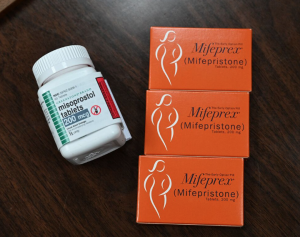 The Justice Department said on Thursday that it would ask the Supreme Court to block a ruling by a federal appeals panel that limited the distribution and access to the abortion pill mifepristone.
The Justice Department said on Thursday that it would ask the Supreme Court to block a ruling by a federal appeals panel that limited the distribution and access to the abortion pill mifepristone.
In a case that has national implications for abortion access, the three-judge panel from the U.S. Court of Appeals for the Fifth Circuit ruled late Wednesday night that mifepristone could remain available while the lawsuit, filed against the Food and Drug Administration by anti-abortion groups, proceeds through the courts.
In its order, the panel partly overruled Judge Matthew J. Kacsmaryk of the Northern District of Texas, who last week declared that the Food and Drug Administration’s approval of mifepristone in 2000 was not valid, in essence saying that the drug should be pulled from the market.
But the appeals panel said it was overturning a series of steps the F.D.A. took in recent years to ease access to the drug — including allowing it to sent through the mail and prescribed by health care providers who are not doctors.
“The Justice Department strongly disagrees with the Fifth Circuit’s decision” Attorney General Merrick B. Garland said in a statement Thursday, adding that the Biden administration would “defend the F.D.A.’s scientific judgment and protect Americans’ access to safe and effective reproductive care.”
The appellate court said its ruling would hold until the full case was heard on its merits.
Danco Laboratories, which makes Mifeprex, the brand-name version of mifepristone, will also petition the court for emergency relief, planning to file Friday, a lawyer for the company, Jessica Ellsworth, said.
In its order, the appellate panel said the F.D.A.’s approval of mifepristone could stand because too much time had passed for the plaintiffs, a consortium of groups and doctors opposed to abortion, to challenge that decision. The court also seemed to take into account the government’s view that removing a long-approved drug from the market would have “significant public consequences.”
Fifth Court of Appeals Order on Abortion Pill Case
But the appellate court said that it was not too late for the plaintiffs to challenge a set of steps the F.D.A. took beginning in 2016 that lifted restrictions and made it easier for more patients to have access to the pill.
The court also said that the government could not logically claim that the changes made since 2016 were crucial to the public “given that the nation operated — and mifepristone was administered to millions of women — without them for 16 years” after the initial pill approval.
The Push to Restrict Abortion Pills
A federal judge in Texas invalidated the F.D.A.’s approval of an abortion pill, mifepristone. The decision could make it more difficult for patients to obtain abortions.
- Dueling Rulings: On the same day as the Texas decision, a federal judge in Washington State issued an opposing ruling in a different case saying that the F.D.A. not limit access to mifepristone in 18 jurisdictions.
- Headwinds at the Supreme Court?: At first blush, the Texas decision’s chances of surviving review by a Supreme Court dominated by conservative justices seem quite promising. But the justices may think twice before embracing it, legal scholars say.
- Implications for the F.D.A.: If upheld, the Texas judge’s ruling poses threats to the U.S. government’s regulatory authority that could go far beyond one drug.
- Stockpiling Abortion Pills: As the ruling could affect availability even where abortion is legal, states led by Democrats have been scrambling to adjust to a possible future without mifepristone.
Those changes approved use of the pill for up to 10 weeks into pregnancy instead of seven weeks, allowed it to be prescribed by some health providers other than doctors and permitted mifepristone to be mailed to patients instead of requiring it to be picked up from a health care provider in person.
Changes since 2016 also included the F.D.A.’s approval in 2019 of a generic version of mifepristone, manufactured by GenBioPro, whose product is now used by many telemedicine abortion services and clinics.
Such steps significantly expanded access to medication abortion, which is now used in more than half of pregnancy terminations in the United States. It usually involves taking mifepristone — which blocks a hormone that allows a pregnancy to develop — followed one or two days later by another drug, misoprostol, which causes contractions similar to a miscarriage.
A lawyer for the plaintiffs, Erin Hawley, senior counsel for the Alliance Defending Freedom, a conservative Christian legal organization, said at a media briefing Thursday that “the Fifth Circuit’s decision is a significant victory for the doctors we represent, women’s health and every American who deserves an accountable federal government acting within the bounds of the law.”
Judge Kacsmaryk, a Trump appointee who has written critically of the Roe v. Wade decision, had stayed his order for seven days to give the F.D.A. time to appeal. On Monday, the F.D.A. had asked the appeals court to extend that stay, and the judges partly granted that request.
In the decision, which came just before midnight on Wednesday, two Trump-appointed judges voted to reimpose some of the restrictions that the F.D.A. had eased. The third judge, appointed by President George W. Bush, said she would essentially have granted the full request. All of those restrictions were temporarily reinstated.
The Justice Department is likely to appeal the order to the Supreme Court. The plaintiffs may also appeal to the Supreme Court and ask it to invalidate the initial approval of mifepristone.
The 42-page appeals court opinion appeared to accept several of the claims of the anti-abortion plaintiffs and used some of the terminologies of abortion opponents, referring to medication abortion as “chemical abortion” and in one instance referring to a fetus or embryo as “an unborn child.”
In their lawsuit, the abortion opponents claim that mifepristone is unsafe, causing “cramping, heavy bleeding and severe pain,” and that the F.D.A. has ignored safety risks and never adequately evaluated the scientific evidence.The F.D.A. vigorously disputes this claim, as do mainstream medical organizations. They say that bleeding and cramping are normal consequences of the process, a sign that the pregnancy tissue is being expelled, and cite years of scientific studies that show that serious complications are rare, resulting in less than 1 percent of patients needing hospitalization. The F.D.A. applies a special regulatory framework to mifepristone, meaning that it has been regulated much more strictly and studied more intensively than most other drugs.
Are Abortion Pills Safe? Here’s the Evidence.
The Times reviewed 101 studies of medication abortion, spanning continents and decades. All concluded that the pills are a safe method for terminating a pregnancy.
In seeking a stay of Judge Kacsmaryk’s ruling, lawyers from the Justice Department, representing the F.D.A., wrote, “There is no basis in science or fact for plaintiffs’ repeated claims that mifepristone is unsafe when used in the manner approved by F.D.A.”
The appeals court did not evaluate all of the safety arguments in the case, but it said that the F.D.A. “cannot deny that serious complications from mifepristone” occur and said that the agreement form that the agency requires patients to sign stipulates that the drug can carry risks. The court also said that the F.D.A. was incorrect in saying that mifepristone was comparable in safety to ibuprofen. “F.D.A.’s own documents show that mifepristone bears no resemblance to ibuprofen,” the court said.
The appeals court also seemed to agree with the plaintiffs that a 19th-century law called the Comstock Act prevents the mailing of drugs used for abortions. The Justice Department said in a recent memo that the act prohibits mailing the pills only if the sender knows they will be used for an illegal abortion, not if the patient is in a state where abortion is legal.
The appeals court wrote that “merely by knowingly making use of the mail for a prohibited abortion item” would violate that law.
Inside the Online Market for Overseas Abortion Pills
For-profit sellers are meeting the demand for unregulated abortion pills — one that will only grow if legal access in the U.S. is further restricted.
The court also disagreed with the F.D.A.’s argument that the plaintiffs did not have legal standing to file the lawsuit. Legal standing requires that plaintiffs incur damage or harm from the actions of the party they are suing.
The plaintiffs said they were injured because they treated some women who needed additional care after taking abortion pills, requiring the doctors to divert medical resources they would have used for other patients and to sometimes act against their moral views and perform a surgical procedure after an incomplete medication abortion. The F.D.A. said that those claims of harm were too far removed from the agency’s actions in regulating mifepristone and that the definition of a doctor’s job was to care for patients so the doctors could not be harmed by doing the job they were trained to do.
The appeals court said that “as a result of F.D.A.’s failure to regulate this potent drug, these doctors have had to devote significant time and resources to caring for women experiencing mifepristone’s harmful effects. This harm is sufficiently concrete.”
The opinion added that the plaintiffs “also face an injury from the irreconcilable choice between performing their jobs and abiding by their consciences.”
The case has attracted interest beyond the groups that usually weigh in on abortion cases. On Monday, more than 400 pharmaceutical industry leaders and investors issued a scathing condemnation of the ruling and demanded that it be reversed.
“If courts can overturn drug approvals without regard for science or evidence, or for the complexity required to fully vet the safety and efficacy of new drugs, any medicine is at risk for the same outcome as mifepristone,” they wrote. Leaving the fate of medicines in the hands of jurists, they argued, would have a chilling effect on drug development in the United States, reducing incentives for investment and innovation.
Source: nytimes.com/










